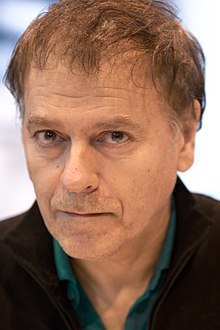Enki Bilal
| Enki Bilal | |
|---|---|

Enki Bilal in March 2010
|
|
| Born | Enes Bilalović October 7, 1951 Belgrade, Serbia, Yugoslavia |
| Nationality | French |
| Area(s) | Comics artist, writer, director |
|
Notable works
|
Nikopol Trilogy, Légendes d'Aujourd'hui, Partie de chasse |
| Awards | full list |
Enki Bilal (French: [bilal]; born October 7, 1951) is a French comic book creator, comics artist and film director.
Born Enes Bilalović in Belgrade, Serbia, Yugoslavia, to a Slovak mother and a Bosnian father who had been Josip Broz Tito's tailor, he moved to Paris at the age of 9. At age 14, he met René Goscinny and with his encouragement applied his talent to comics. He produced work for Goscinny's Franco-Belgian comics magazine Pilote in the 1970s, publishing his first story, Le Bal Maudit, in 1972.
In 1975, Bilal began working with script writer Pierre Christin on a series of dark and surreal tales, resulting in the body of work titled Légendes d'Aujourd'hui.
In 1983, Bilal was asked by film director Alain Resnais to collaborate on his film La vie est un roman, for which Bilal provided painted images that were incorporated in the "medieval" episodes of the film.
He is best known for the Nikopol trilogy (La Foire aux immortels, La Femme piège and Froid Équateur), which took more than a decade to complete. Bilal wrote the script and did the artwork. The final chapter, Froid Équateur, was chosen book of the year by the magazine Lire and is acknowledged by the inventor of chess boxing, Iepe Rubingh as the inspiration for the sport.
...
Wikipedia
